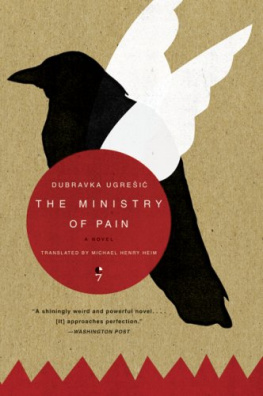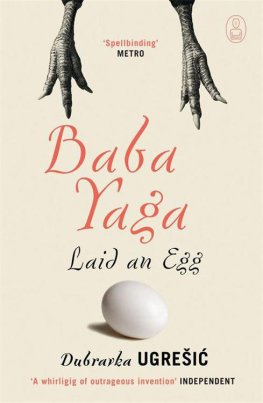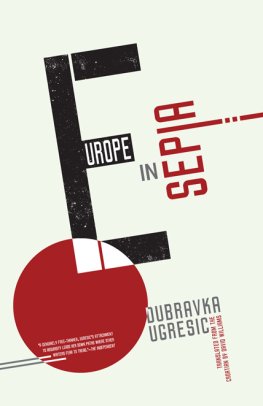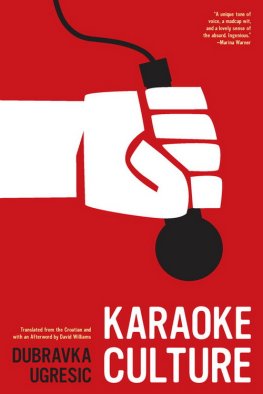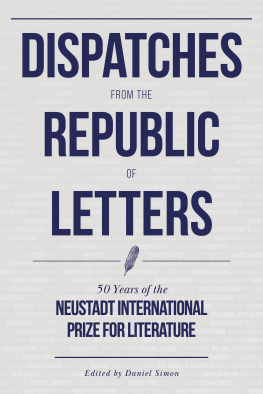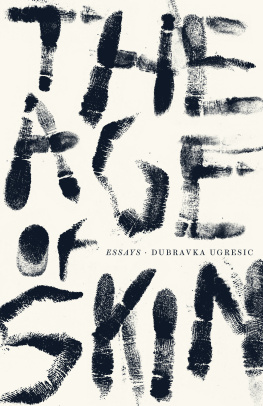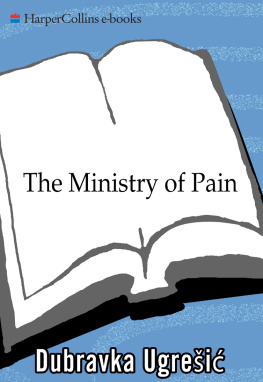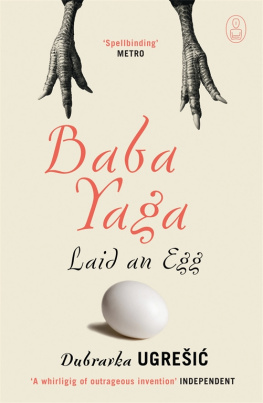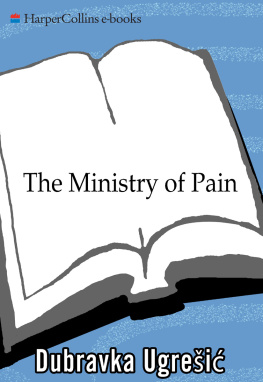Dubravka Ugresic - The Ministry of Pain
Here you can read online Dubravka Ugresic - The Ministry of Pain full text of the book (entire story) in english for free. Download pdf and epub, get meaning, cover and reviews about this ebook. year: 2009, publisher: HarperCollins, genre: Detective and thriller. Description of the work, (preface) as well as reviews are available. Best literature library LitArk.com created for fans of good reading and offers a wide selection of genres:
Romance novel
Science fiction
Adventure
Detective
Science
History
Home and family
Prose
Art
Politics
Computer
Non-fiction
Religion
Business
Children
Humor
Choose a favorite category and find really read worthwhile books. Enjoy immersion in the world of imagination, feel the emotions of the characters or learn something new for yourself, make an fascinating discovery.
- Book:The Ministry of Pain
- Author:
- Publisher:HarperCollins
- Genre:
- Year:2009
- Rating:4 / 5
- Favourites:Add to favourites
- Your mark:
- 80
- 1
- 2
- 3
- 4
- 5
The Ministry of Pain: summary, description and annotation
We offer to read an annotation, description, summary or preface (depends on what the author of the book "The Ministry of Pain" wrote himself). If you haven't found the necessary information about the book — write in the comments, we will try to find it.
The Ministry of Pain — read online for free the complete book (whole text) full work
Below is the text of the book, divided by pages. System saving the place of the last page read, allows you to conveniently read the book "The Ministry of Pain" online for free, without having to search again every time where you left off. Put a bookmark, and you can go to the page where you finished reading at any time.
Font size:
Interval:
Bookmark:

Translated by Michael Henry Heim

NOTE
The narrator, her story, the characters and their situation in the novel you are about to read are all fictional. Not even the city of Amsterdam is wholly real.
D. U.
I dont remember when I first noticed it. Id be
They called me Professor Luci at first, but once wed
at first, but once wed
The first time I entered the classroom I could tell
The first thing I required of them was to write
Occasionally, when confronting my own image in the bathroom mirror,
I told them they had nothing to worry about: they
At the Department I felt somewhat of a stowaway. I
Our game derived from Anas symbolic bag.
Surrounded by the indifferent walls of our imaginary laboratory, we
Amsterdam is one of the most beautiful cities in the
I kept thinking we had time to burn, but the
Ill pick you up at the airport, she said. Dont
Once Id left, I could never quite get it together,
I watched her pricking her finger with the needle and
I bought a few boxes of the requisite chocolates at
The day after I got back to Amsterdam I paid
I didnt know what to do. I paced the cramped
The complex housing the ICTFY, the International Criminal Tribunal for
Leaving the courtroom was like leaving a funeral at which
Eventually Ines and Cees did invite me over. Truth to
I paused in front of the door. A mere two
I couldnt quite pinpoint what had brought it on. There
And then came the exam. There they wereall four of
I walked slowly down the five flights of stairs and
You one of us? he asks with a shrewd look
I knew it was Igor the moment I heard the
After Igors departure an image of my first year in
I was plagued by nightmares at the beginning of the
We are barbarians. The members of our tribe bear the
I stood, pulled down the first video that came to
I left the flat and headed toward the metro station.
Life is sometimes so confusing that you cant be certain
Those pangs of homesickness!
That long since detected upheaval!
I am altogether indifferent
As to where to be altogether
Alone or how to drag my tote
From bazaar to house and home,
A home that is mine no more
Than a hospital or garrison;
Indifferent to what sort of people
Will see me, the caged lion, bristle
And from what sort of world I will
As I mustbe banished into
Myself and my own feelings.
Like a Kamchatka bear with no ice floe,
I dont care where not to fit in
(I dont try to) and where to eat crow.
Nor am I charmed by my mother
Tongues call, cajoling and creamy:
I set no great store by the tongue that others
Use to misconstrue me
(Readers solely intent upon
Milking the press of its bletherings),
For theyre of this twentieth century,
And I precede the centuries.
I am stunned like a log left to lie
On a path with trees. Everyones the same
To me, its all the same to me,
And what is all the more the same
And closest of all, perhaps, is the past.
All my features, all traces, all dates
Have vanished into its morass:
I am merely a soul bornsomewhere.
My country has so let me down
That should a sharp-eyed sleuth
Search that soul inside out
It would fail to sleuth forth native roots.
Every house is alien, every temple empty,
All the same, all one, all mere trash.
But if by the road theres a tree
That chances to be moutain ash
Marina Tsvetaeva
The northern landscape like the desert makes for absolutism. Except that in the north the desert is green and full of water. And there are no temptations, no roundnesses or curves. The land is flat, which makes people extremely visible, and that in turn is visible in their behavior. The Dutch are not much for contact; they are for confrontation. They bore their luminous eyes into those of another and weigh his soul. They have no hiding places. Not even their houses. They leave their curtains open and consider it a virtue.
Cees Nooteboom
I dont remember when I first noticed it. Id be standing at a tram stop waiting for a tram, staring at the map of the city in the glass case, at the color-coded bus and tram routes that I didnt understand and that were of little or no interest to me at the time, standing there without a thought in the world when suddenly, out of the blue, Id be overcome by a desire to bash my head into the glass and do myself harm. And each time Id come closer to it. Here I go, any second now, and then
Come now, Comrade, he would say in a slightly mocking tone, laying a hand on my shoulder. Youre not really going to?
Its all my imagination, of course, but the picture it creates can be so real that I actually think Im hearing his voice and feeling his hand on my shoulder.
People say that the Dutch speak only when they have something to say. In this city, where Im surrounded by Dutch and communicate in English, I often perceive my native language as alien. Not until I found myself abroad did I notice that my fellow countrymen communicate in a kind of half language, half swallowing their words, so to speak, and uttering semi-sounds. I experience my native language as an attempt by a linguistic invalid to convey even the simplest thought through gestures, grimaces, and intonations. Conversations among my compatriots seem long, exhausting, and devoid of content. Instead of talking, they seem to be stroking each other with words, spreading a soothing, sonorous saliva over one another.
Thats why I have the feeling Im learning to speak from scratch here. And its not easy. Im constantly on the lookout for breathing spaces to deal with the fact that I cant express what I have in mind. And theres the larger question of whether a language that hasnt learned to depict reality, complex as the inner experience of that reality may be, is capable of doing anything at alltelling stories, for instance.
And I was a literature teacher.
After going to Germany, Goran and I settled in Berlin. Germany had been Gorans choice: Germany did not require visas. Wed saved up quite a bit, enough for a year. I quickly found my feet: I landed a job as a nanny for an American family. The Americans paid me more than a decent wage and proved to be decent people. I also found a part-time job at the National Library, shelving books in the Slavic Division one day a week. Since I knew a thing or two about libraries, spoke Russian in addition to our language, and could make sense out of the other Slavic tongues, the work came easy to me. I lacked the proper work permit, however, so they had to pay me under the counter. As for Goran, whod taught mathematics at the University of Zagreb, he soon found employment in a computer firm, but he resigned after a few months: a colleague of his had been hired as a lecturer at a university in Tokyo and was trying to lure Goran there, assuring him he would get a better job forthwith. Goran in turn tried to persuade me to leave, but I held out: I was a West European, I said by way of self-justification, and I wanted to be close to my mother and his parents. Which was true. But there was another truth.
Font size:
Interval:
Bookmark:
Similar books «The Ministry of Pain»
Look at similar books to The Ministry of Pain. We have selected literature similar in name and meaning in the hope of providing readers with more options to find new, interesting, not yet read works.
Discussion, reviews of the book The Ministry of Pain and just readers' own opinions. Leave your comments, write what you think about the work, its meaning or the main characters. Specify what exactly you liked and what you didn't like, and why you think so.

